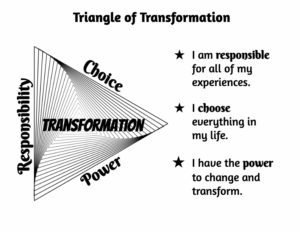Table of Contents
Introduction: The Foundation of Transformation
Transformation is not merely a therapeutic technique; it is a complete reorientation of how individuals view themselves, their experiences, and the world around them. At the heart of this approach lies a fundamental belief: we are not victims of our circumstances but rather the creators of our experiences. Rooted in the idea that thoughts and beliefs shape our reality, the Transformation process empowers individuals to confront and change their core self-perceptions to heal from substance use disorders, addiction, and mental health challenges such as anxiety, depression, and low self-esteem.
This counseling philosophy centers on what is referred to as the Triangle of Transformation: Responsibility, Choice, and Power. These three principles form the cornerstone of a profound inner change and healing journey. Let us now examine the foundational elements and therapeutic processes of Transformation.
The Core Concept: Self-Perception as the Root
Dr. Maxwell Maltz’s work on self-image underpins the Transformation model. The core idea is that our self-image—our beliefs about our value and worth as human beings—directly determines our feelings, behaviors, and ultimately our experiences. For many struggling with addiction or mental health disorders, this self-image is marred by deeply internalized messages of inadequacy, unworthiness, or defectiveness. These beliefs drive negative thoughts, which then manifest as destructive behaviors.
Transformation addresses these internalized beliefs by challenging and replacing them with affirmations of self-worth, adequacy, and love. It is this psychological reconditioning—an intentional restructuring of internal dialogue—that enables lasting healing.
The Triangle of Transformation

Responsibility: I Am Responsible for All My Experiences
Responsibility in Transformation does not equate to blame or guilt. Rather, it is the liberating recognition that we are the authors of our lives. Every experience we have—whether positive or negative—is the result of thoughts, beliefs, and choices we have made.
From early childhood, we unconsciously adopt ideas about ourselves and the world. These ideas become the foundation of our self-image. If these internalized messages were negative, they would likely give rise to struggles with addiction, depression, anxiety, and low self-esteem. The key to healing, therefore, begins with reclaiming responsibility for our own thinking and emotional patterns.
When clients in transformational counseling accept that they are responsible for their experiences, they reclaim the ability to change them. This principle eradicates the notion of victimhood. It replaces passive suffering with active engagement, encouraging individuals to become conscious creators of their life story.
Choice: I Choose Everything in My Life
The power of choice is the second pillar of Transformation. Every thought, belief, feeling, word, and action is a choice. We are always choosing—whether consciously or unconsciously—how we think, feel, and behave. Most people do not realize the incredible autonomy they possess in shaping their internal world.
The transformational process emphasizes becoming aware of the moment-to-moment choices we make, especially the thoughts we choose to think about ourselves. For instance, continuing to believe “I am not good enough” is a choice—albeit an unconscious one. The opportunity lies in choosing to believe something different: “I am whole, perfect, and complete.”
Through repeated, conscious choices to think positively, clients begin to reshape their self-image. As this transformation of thought occurs, behaviors and external circumstances begin to shift accordingly.
Power: I Have the Power to Transform My Life
The final vertex of the Triangle of Transformation is Power. True power is the ability to transform our lives from within. Once individuals recognize that they are responsible for their experiences and that they have the ability to choose new thoughts and beliefs, they can access the transformative power that has always resided within them.
Power is not force; it is not control over others. It is internal sovereignty—the ability to shift one’s perceptions and therefore change the quality of one’s life. Clients are taught that their current reality is the manifestation of past thoughts and beliefs. To change the future, they must change their thinking in the present moment.
Power lies in this very moment—in the thought one chooses to think, the word one chooses to speak, and the action one chooses to take.
The Therapeutic Process of Transformation
Transformation is structured as a journey that helps clients gradually rebuild their self-image, break free from addiction, and resolve mental health issues. The therapeutic process includes:
- Identifying Negative Core Beliefs
- Clients are guided to recognize long-held beliefs about themselves that have contributed to addiction and emotional suffering.
- Common beliefs include: “I am not good enough,” “I am broken,” or “I am a failure.”
- Accepting Total Responsibility
- Clients learn that they have created these beliefs through repetition and reinforcement.
- They are taught to acknowledge their role in perpetuating these beliefs.
- Reclaiming the Power of Choice
- Clients are empowered to choose new, life-affirming beliefs.
- They begin practicing these beliefs through affirmations and intentional thinking.
- Integrating New Thought Patterns
- Transformation involves repetition and mindfulness.
- Clients engage in mirror work, journaling, and other practices to reinforce new beliefs.
- Creating a New Self-Image
- Over time, these positive beliefs form a new self-image rooted in self-worth and authenticity.
- With a transformed self-image, clients begin to act and live differently.
- Sustaining Change Through Conscious Awareness
- Clients continue to monitor their thoughts and emotional responses.
- Responsibility, choice, and power remain the daily guideposts of continued healing and growth.
From Addiction to Authenticity: A Realigned Self
Transformation leads individuals out of the darkness of addiction and mental distress by helping them reconnect with their innate wholeness. Once they fully embody the principles of responsibility, choice, and power, the need to numb pain or seek external validation diminishes.
As self-image improves, so does behavior. Individuals no longer feel the compulsion to engage in destructive habits because they no longer believe they are broken or unworthy. Their actions reflect their new beliefs: they are whole, they are valuable, and they are loved.
The Conversation of Transformation
Transformation also invites a new way of speaking—internally and externally. Clients learn to engage in what is called the Conversation of Transformation:
- Speaking kindly and lovingly to oneself.
- Replacing negative internal dialogue with affirmations of truth and value.
- Using words that empower rather than disempower.
This conversation becomes a daily practice that builds momentum. With every kind word spoken to oneself, with every reaffirmation of worth, the transformational process deepens.
Conclusion: Living the Transformed Life
Transformation is not a temporary intervention; it is a new way of life. It is a reawakening to the truth that each of us is the source of our reality. Through the Triangle of Transformation—Responsibility, Choice, and Power—clients learn to reclaim authorship of their lives.
The therapeutic journey is one of returning home to oneself, dissolving the illusion of inadequacy, and awakening to one’s intrinsic value. In this state of self-love and authenticity, addiction and mental health issues begin to dissolve.
Transformation restores hope, rekindles purpose, and reclaims power. It is a path toward healing, self-realization, and ultimately, inner peace.
Dr. Harry Henshaw
Enhanced Healing Counseling Music

Get Free from Addiction!
Discover a groundbreaking perspective on addiction recovery. Click below to buy Prelude to a Paradigm Shift for Addiction and explore innovative solutions to transform the way we understand and treat substance use disorders.
About Enhanced Healing
Enhanced Healing Counseling specializes in addiction recovery, mental health, and self-esteem support. Offering online and in-person services, we empower individuals to transform their lives with personalized care and proven therapeutic methods.




